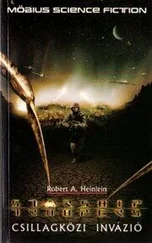Robert Heinlein - Rocket Ship Galileo
Здесь есть возможность читать онлайн «Robert Heinlein - Rocket Ship Galileo» весь текст электронной книги совершенно бесплатно (целиком полную версию без сокращений). В некоторых случаях можно слушать аудио, скачать через торрент в формате fb2 и присутствует краткое содержание. Жанр: Фантастика и фэнтези, на английском языке. Описание произведения, (предисловие) а так же отзывы посетителей доступны на портале библиотеки ЛибКат.
- Название:Rocket Ship Galileo
- Автор:
- Жанр:
- Год:неизвестен
- ISBN:нет данных
- Рейтинг книги:3 / 5. Голосов: 1
-
Избранное:Добавить в избранное
- Отзывы:
-
Ваша оценка:
- 60
- 1
- 2
- 3
- 4
- 5
Rocket Ship Galileo: краткое содержание, описание и аннотация
Предлагаем к чтению аннотацию, описание, краткое содержание или предисловие (зависит от того, что написал сам автор книги «Rocket Ship Galileo»). Если вы не нашли необходимую информацию о книге — напишите в комментариях, мы постараемся отыскать её.
Rocket Ship Galileo — читать онлайн бесплатно полную книгу (весь текст) целиком
Ниже представлен текст книги, разбитый по страницам. Система сохранения места последней прочитанной страницы, позволяет с удобством читать онлайн бесплатно книгу «Rocket Ship Galileo», без необходимости каждый раз заново искать на чём Вы остановились. Поставьте закладку, и сможете в любой момент перейти на страницу, на которой закончили чтение.
Интервал:
Закладка:
Art gave a low respectful whistle. "How would you like to have been under that?" Ross inquired in a hushed voice.
"Not any place in the same county—or the next county. How would you like to be in a city when one of those things goes off?"
Ross shook his head. "I want to zig when it zags. Art, they better never have to drop another one, except in practice. If they ever start lobbing those things around, it ‘ud be the end of civilization."
"They won't," Art assured him. "What d'you think the UN police is for? Wars are out. Everybody knows that."
"You know it and I know it. But I wonder if everybody knows it?"
"It'll be just too bad if they don't."
"Yeah—too bad for us."
Art climbed out of the car. "I wonder if we can get down to it?
"Well, don't try. We'll find out later."
"There can't be any duds in the crater or anywhere in the area—not after that."
"Don't forget our friend that the buzzards ate. Duds that weren't exposed to the direct blast might not go off. This bomb was set off about five miles up."
"Huh? I thought-"
"You were thinking about the test down in Chihuahua. That was a ground job. Come on. We got work to do." He trod on the starter.
The cabin was pre-fab, moved in after the atom bomb test to house the radioactivity observers. It had not been used since and looked it.
"Whew! What a mess," Art remarked. "We should have brought a tent."
"It'll be all right when we get it fixed up. Did you see kerosene in that stuff outside?"
"Two drums of it."
"Okay. I'll see if I can make this stove work. I could use some lunch." The cabin was suitable, although dirty. It had drilled well; the water was good, although it had a strange taste. There were six rough bunks needing only bedding rolls. The kitchen was the end of the room, the dining room a large pine table, but there were shelves, hooks on the walls, windows, a tight roof overhead. The stove worked well, even though it was smelly; Ross produced scrambled eggs, coffee, bread and butter, German-fried potatoes, and a bakery apple pie with only minor burns and mishaps.
It took all day to clean the cabin, unload the car, and uncrate what they needed at once. By the time they finished supper, prepared this time by Art, they were glad to crawl into their sacks. Ross was snoring gently before Art closed his eyes. Between Ross's snores and the mournful howls of distant coyotes Art was considering putting plugs in his ears, when the morning sun woke him up.
"Get up, Ross!"
"Huh? What? Wassamatter?"
"Show a leg. We're burning daylight."
"I'm tired," Ross answered as he snuggled back into the bedding. "I think I'll have breakfast in bed."
"You and your six brothers. Up you come—today we pour the foundation for the shop."
"That's right." Ross crawled regretfully out of bed. "Wonderful weather—I think I'll take a sun bath."
"I think you'll get breakfast, while I mark out the job."
"Okay, Simon Legree."
The machine shop was a sheet metal and stringer affair, to be assembled. They mixed the cement with the sandy soil of the desert, which gave them a concrete good enough for a temporary building. It was necessary to uncrate the power tools and measure them before the fastening bolts could be imbedded in the concrete. Ross watched as Art placed the last bolt. "You sure we got ‘em all?"
"Sure. Grinder, mill, lathe-" He ticked them off. "Drill press, both saws-"
They had the basic tools needed for almost any work. Then they placed bolts for the structure itself, matching the holes in the metal sills to the bolts as they set them in the wet concrete. By nightfall they had sections of the building laid out, each opposite its place, ready for assembly. "Do you think the power line will carry the load?" Art said anxiously, as they knocked off.
Ross shrugged. "We won't be running all the tools at once. Quit worrying, or we'll never get to the moon. We've got to wash dishes before we can get supper."
By Saturday the tools had been hooked up and tested, and Art had rewound one of the motors. The small mountain of gear had been stowed and the cabin was clean and reasonably orderly. They discovered in unpacking cases that several had been broken open, but nothing seemed to have been hurt. Ross was inclined to dismiss the matter, but Art was worried. His precious radio and electronic equipment had been gotten at.
"Quit fretting," Ross advised him. "Tell Doc about it when he comes. The stuff was insured."
"It was insured in transit," Art pointed out. "By the way, when do you think they will get here?"
"I can't say," Ross answered. "If they come by train, it might be Tuesday or later. If they fly to Albuquerque and take the bus, it might be tomorrow—what was that?" He glanced up.
"Where?" asked Art.
"There. Over there, to your left. Rocket."
"So it is! It must be a military job; we're off the commercial routes. Hey, he's turned on his nose jets!"
"He's going to land. He's going to land here!"
"You don't suppose?"
"I don't know. I thought—there he comes! It can't-" His words were smothered when the thunderous, express-train roar reached them, as the rocket decelerated. Before the braking jets had been applied, it was traveling ahead of its own din, and had been, for them, as silent as thought. The pilot put it down smoothly not more than five hundred yards from them, with a last blast of the nose and belly jets which killed it neatly.
They began to run.
As they panted up to the sleek, gray sides of the craft, the door forward of the stub wings opened and a tall figure jumped down, followed at once by a smaller man.
"Doc! Morrie!"
"Hi, sports!" Cargraves yelled. "Well, we made it. Is lunch ready?"
Morrie was holding himself straight, almost popping with repressed emotion.
"I made the landing," he announced.
"You did?" Art seemed incredulous.
"Sure. Why not? I got my license. Want to see it?"
"‘Hot Pilot Abrams,' it says here," Ross alleged, as they examined the document. "But why didn't you put some glide on it? You practically set her down on her jets."
"Oh, I was practicing for the moon landing."
"You were, huh? Well, Doc makes the moon landing or I guarantee I don't go."
Cargraves interrupted the kidding. "Take it easy. Neither one of us will
try an airless landing."
Morrie looked startled. Ross said, "Then who-"
"Art will make the moon landing."
Art gulped and said, "Who? Me?"
"In a way. It will have to be a radar landing; we can't risk a crack-up on anything as hard as an all jet landing when there is no way to walk home. Art will have to modify the circuits to let the robot-pilot do it. But Morrie will be the stand-by," he went on, seeing the look on Morrie's face. "Morrie's reaction time is better than mine. I'm getting old. Now how about lunch? I want to change clothes and get to work."
Morrie was dressed in a pilot's coverall, but Cargraves was wearing his best business suit. Art looked him over. "How come the zoot suit, Uncle? You don't look like you expected to come by rocket. For that matter, I thought the ship was going to be ferried out?"
"Change in plans. I came straight from Washington to the field and Morrie took off as soon as I arrived. The ship was ready, so we brought it out ourselves, and saved about five hundred bucks in ferry pilot charges." "Everything on the beam in Washington?" Ross asked anxiously.
"Yes, with the help of the association's legal department. Got some papers for each of you to sign. Let's not stand here beating our gums. Ross, you and I start on the shield right away. After we eat."
"Good enough."
Ross and the doctor spent three days on the hard, dirty task of tearing out the fuel system to the tail jets. The nose and belly jets, used only in maneuvering and landing, were left unchanged. These operated on aniline and nitric fuel; Cargraves wanted them left as they were, to get around one disadvantage of atomic propulsion-the relative difficulty in turning the power off and on when needed.
Читать дальшеИнтервал:
Закладка:
Похожие книги на «Rocket Ship Galileo»
Представляем Вашему вниманию похожие книги на «Rocket Ship Galileo» списком для выбора. Мы отобрали схожую по названию и смыслу литературу в надежде предоставить читателям больше вариантов отыскать новые, интересные, ещё непрочитанные произведения.
Обсуждение, отзывы о книге «Rocket Ship Galileo» и просто собственные мнения читателей. Оставьте ваши комментарии, напишите, что Вы думаете о произведении, его смысле или главных героях. Укажите что конкретно понравилось, а что нет, и почему Вы так считаете.












